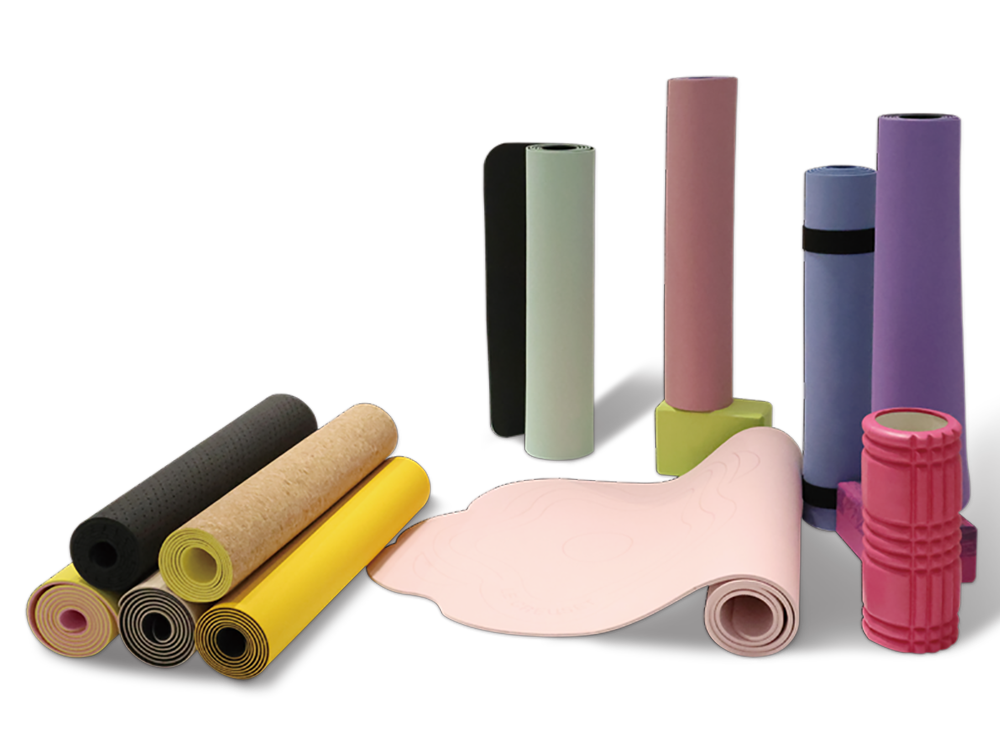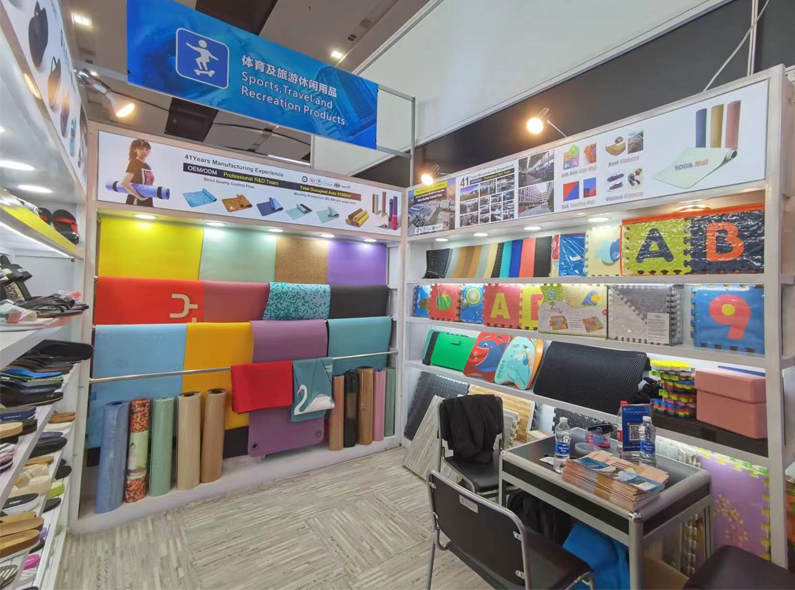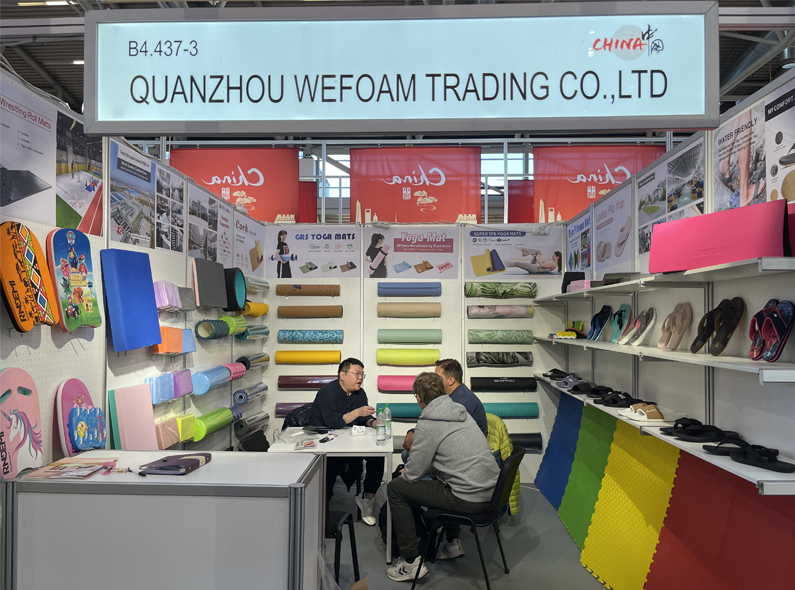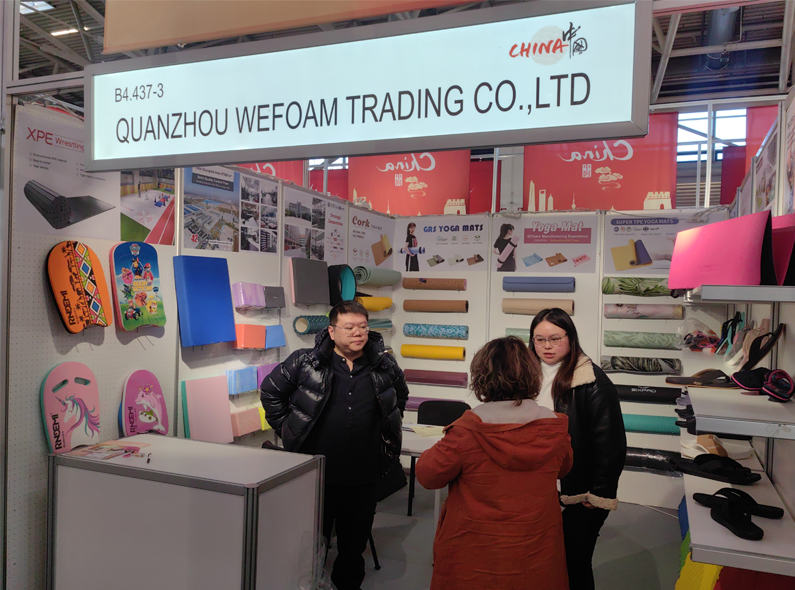(1)Non-Toxic & Safe
TPE is free from PVC, phthalates, and heavy metals, making it a safer alternative for direct skin contact and indoor use.
(2)Recyclable & Low Waste
As a thermoplastic material, TPE can be fully recycled through melting and reprocessing, reducing landfill waste compared to traditional rubber.
(3)Reduced Carbon Footprint
TPE production consumes less energy than vulcanized rubber, and its lightweight nature lowers transportation emissions.
(4)Biodegradable Options
Some TPE variants are blended with plant-based polymers (e.g., corn starch), enhancing biodegradability under industrial composting conditions.
(5)Durability = Less Replacement
High abrasion resistance extends product lifespan, indirectly reducing environmental impact from frequent replacements.




TPE Yoga Mat Technical Specifications
1.Dimensions:
- Standard: 72" × 24" (183cm × 61cm)
- Extra width: 72" × 31" (183cm × 80 cm)
- Double size :72" × 48" (183cm × 122cm)
- Thickness: 0.16"-0.8" (4mm-20mm)
- Weight: 1.76 lbs (0.8 kg) for the standard size 183cm × 61cm× 6mm
2.Eco-Certifications
- Certifications : ISO 14001 , GRS (Global recycled standard)
- Recyclability:
Recyclable
Biodegradable
- Safety:
Free From: PVC, phthalates, heavy metals (REACH/CPSC compliant)
VOCs: <0.1mg/m³ (indoor air quality standard)
3. Solutions
(1)Occasions
①Yoga Practice – Provides cushioning and grip for poses Pilates/Stretching – Supports controlled movements and spinal alignment.
②Floor Exercises – Used for sit-ups, planks, or HIIT workouts to prevent slipping.
③Meditation – Creates a comfortable, non-slip surface for seated practices.
④ravel/Outdoor Workouts – Lightweight and portable for parks or gym sessions.
(2)Comparative Analysis: TPE Yoga Mat vs. Other Materials
A detailed comparison of TPE (Thermoplastic Elastomer) yoga mats with other common materials (e.g., PVC, Natural Rubber, NBR, EVA), covering eco-friendliness, durability, comfort, and price to help you choose the best fit:
1. TPE (Thermoplastic Elastomer)
- Pros:
✅ Eco-friendly: Recyclable and non-toxic, free from chlorine (PVC) or rubber odors.
✅ Lightweight & Grippy: 30% lighter than PVC, with textured surfaces for slip-resistant workouts.
✅ Easy to Clean: Sweat-resistant closed-cell structure; wipes clean easily.
- Cons:
❌ Moderate durability (3–5 years); may retain creases if folded long-term.
❌ mid-range between PVC and natural rubber.
Ideal for: Eco-conscious users, beginners/intermediate yogis, or those prioritizing portability.
2. PVC (Polyvinyl Chloride)
- Pros:
✅ Budget-friendly: Lowest cost and highly durable (5+ years).
✅ Thick cushioning: Often 10mm thick, ideal for joint-sensitive users.
- Cons:
❌ Non-eco-friendly: Contains chlorine, slow to decompose.
❌ Heavy and absorbs sweat: Requires frequent cleaning; grip weakens when wet
Ideal for: Budget buyers or home users needing high cushioning.
3. Natural Rubber
- Pros:
✅ Superior grip: Natural texture + moisture absorption, perfect for intense styles like Ashtanga.
✅ Long lifespan: Resists wear/tear, lasts 8–10 years.
-Cons:
❌ Expensive and may trigger latex allergies.
❌ Heavy (1.5–3kg), less portable.
Ideal for: Professional yogis or those prioritizing grip/durability.
4. NBR (Nitrile Rubber) & EVA (Ethylene-Vinyl Acetate)
- NBR:
Pros: Ultra-thick (10–15mm), affordable , good for rehab exercises.
Cons: Poor grip, deforms easily, short lifespan (1–2 years).
- EVA:
Pros: Very light/cheap, often used for kids’ mats or temporary setups.
Cons: Low support, prone to wear.
Ideal for: Occasional use or temporary needs.
Summary Table
|
Material |
Eco-Friendliness |
Durability |
Grip |
Weight |
Price Range |
|
TPE |
★★★★★ |
★★★☆ |
★★★☆ |
Light |
Medium |
|
PVC |
★★☆ |
★★★★☆ |
★★★★☆ |
Heavy |
cheap |
|
Natural Rubber |
★★★★☆ |
★★★★★ |
★★★★★ |
Very Heavy |
Most expensive |
|
NBR |
★★★☆ |
★★☆ |
★★☆ |
Medium |
Cheapest |
|
EVA |
★★★☆ |
★★☆ |
★☆ |
Ultra-Light |
Cheapest |
Recommendations:
- Choose TPE for balance or Natural Rubber for elite performance.
- Avoid NBR/EVA for long-term use; PVC suits low budget and durability needs.